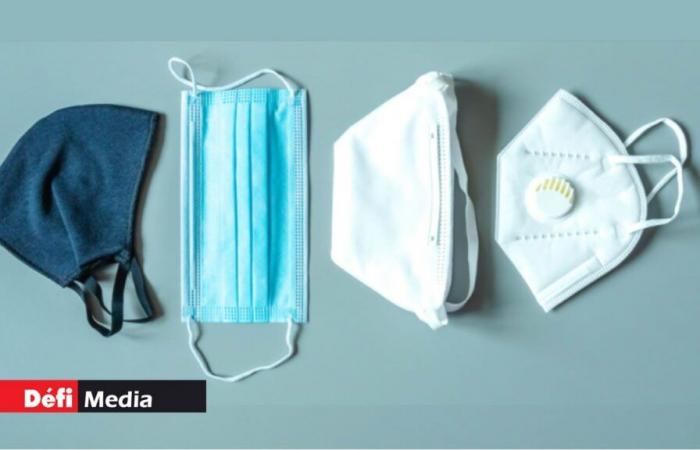The purchase of medicines and medical equipment, including N95 type masks at Rs 250 each, by the government during the Covid-19 pandemic is resurfacing. This controversial file, linked to the emergency acquisition procedure put in place at the time, is currently the subject of an investigation by the Ministry of Trade and Consumer Protection and the Ministry of Health.
This was confirmed by the Minister of Commerce, Michael Sik Yuen, during the program Au coeur de l’info. The objective of the investigation is to determine whether there were irregularities or abuses in the emergency purchasing procedures carried out at the time under the cover of Emergency Procurement.
The State Trading Corporation (STC), which falls under this ministry and which is the state entity usually responsible for the importation of basic products such as rice, oil and even flour, was mandated in 2020 by the previous government to ensure the purchase of medicines and medical equipment during the first waves of the Covid-19 pandemic. A decision justified, at the time, by the health emergency and the need for rapid intervention to supply the country with essential products, particularly when international borders were largely disrupted.
In May 2024, during a Private Notice Question (PNQ) asked by Shakeel Mohamed, then leader of the opposition, former Prime Minister Pravind Jugnauth confirmed before Parliament that the file was the subject of an investigation. On this occasion, he declared that the former Independent Commission Against Corruption (ICAC) had initiated investigations, since taken up by the new Financial Crimes Commission (FCC), created under the Financial Crimes Commission Act. However, under section 161 of this law, no information relating to ongoing investigations can be disclosed publicly, the former head of government clarified. Pravind Jugnauth added: “I have not been questioned at this stage by the competent authorities. Concerning the other members of the High-Level Committee, I am not in a position to comment.”
It was also a matter of examining the conditions under which these acquisitions were made. At issue: the so-called “emergency procurement” procedure, which made it possible to bypass traditional calls for tenders to save time. Although this provision is provided for by law in emergency situations, it raises questions about the transparency and value for money of imported products.
Exceptional procedure
The opposition at the time believed that this exceptional procedure, although it met a public health imperative, could have been used without the usual control mechanisms, opening the way to possible irregularities. Several preliminary reports had already, in the past, highlighted prices considered high for certain drugs and equipment, as well as questions about the suppliers chosen.
Among them, Pack & Blister, which had won two contracts. One of Rs 476,329,362.30, to provide five million surgical masks, one million N95 masks, 100,000 pieces of protective equipment and 50 artificial respirators. These artificial respirators, defective, had been returned to the sender. The second was to provide 29,000 pieces of protective equipment for the sum of Rs 1,282,500.
Bo Digital Co was another firm awarded a contract for masks, protective equipment and thermal cameras for the sum of Rs 308,585,400.
The opposition and civil society organizations denounced a lack of transparency in the transactions. They had even called for independent investigations to shed light on the amounts committed and the conditions of the contracts awarded.
Purchase of Molnupiravir: no internal investigation carried out by Health
No internal investigation was carried out by the Ministry of Health following the controversial purchase of 9,900 capsules of Molnupiravir nor any charge lodged before the Court, maintained the responsible minister, Anil Bachoo in response to the question of the MP Rubna Daureeawo.
He highlighted the Ministry of Health awarded a contract to CPN Distributors Ltd via the emergency procurement method for the supply of 9,900 capsules of Molnupiravir on December 7, 2021. The total amount amounted to Rs 79,840,000, 88, or Rs 79.92 per unit.
If in mid-December 2021, the Anti-Corruption Commission (Icac) opened an investigation into the supply contracts for Molnupiravir intended for the treatment of patients with Covid-19, to date, there is no police investigation concerning these contracts. However, the matter is being investigated by the Financial Crimes Commission. “At this stage, no formal charges have been filed in the District Court,” Minister Bachoo also affirmed.
When the PAC reported irregularities
In 2022, the Public Accounts Committee (PAC), then chaired by Reza Uteem, currently Minister of Labor, denounced multiple offenses and opaque practices having marked the Covid-19 Emergency Procurements financed by public funds to the tune of 1.7 billion of rupees in 2020.
Among the findings made by the PAC, there was the absence of transparency. The report specified that “no record was kept in respect of the choice of the suppliers and the reasonableness of the prices quoted by them”. In other words, there is no document justifying the supplier selection criteria or the negotiated prices.
Officials from the Ministries of Health and Commerce claimed before the PAC that they had carried out verbal instructions emanating from their respective ministers or from the Covid-19 High-Level Committee, chaired by the Prime Minister. The representative of the Ministry of Health declared: “The Minister received instructions, and we execute as executors of decisions”, adding that no written report was available to attest to these directives.
The role of the State Trading Corporation (STC) as implementer was also highlighted in the report. This would have acted as a simple “paying agent” under the directives of the Ministry of Health. The PAC emphasized that specifications for drugs and equipment came from the ministry, while STC only handled financial transactions, with these payments then being reimbursed by the Ministry of Health.
The PAC had also drawn attention to worrying practices concerning contracts awarded to those close to power, while noting that payment for these contracts was done “almost automatically”.
A major point raised by the PAC concerns the direct involvement of ministers in the contract award process. The committee recalled in its report that, according to the National Assembly Regulations and clause 68 of the Constitution, ministers must not intervene in public procurement procedures, a responsibility which falls exclusively to the Accounting Officers of the ministries concerned.






